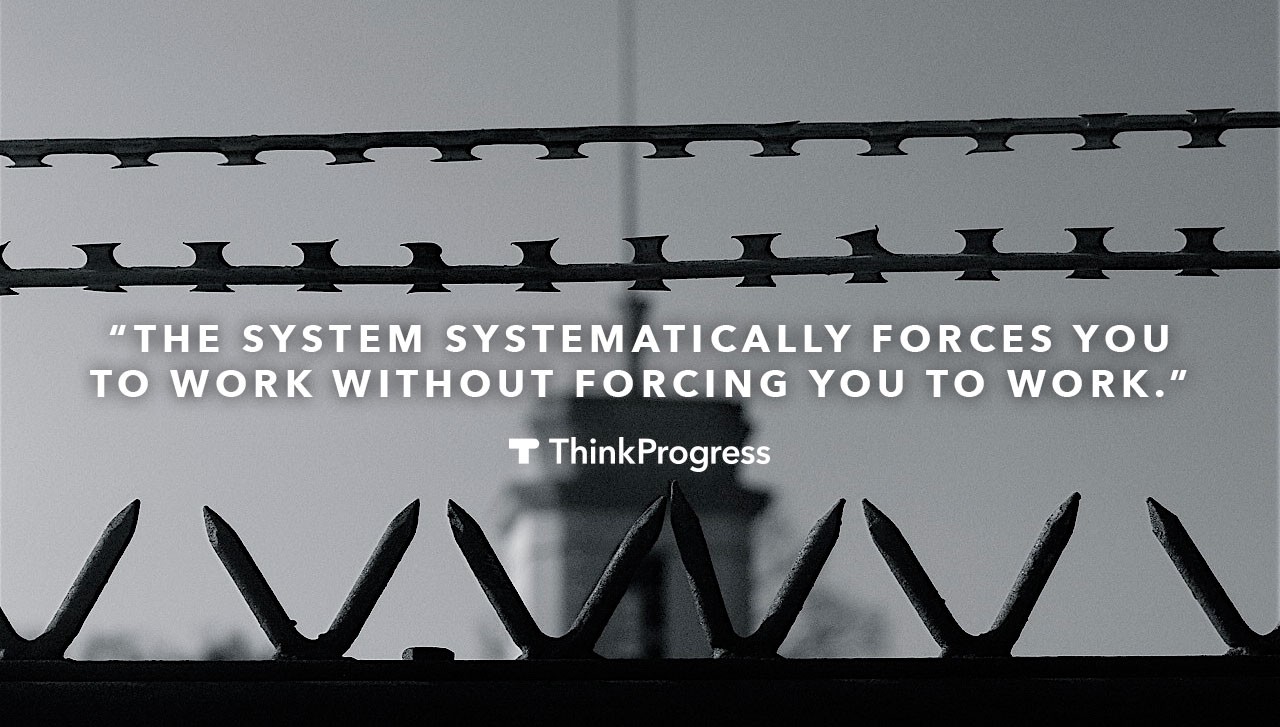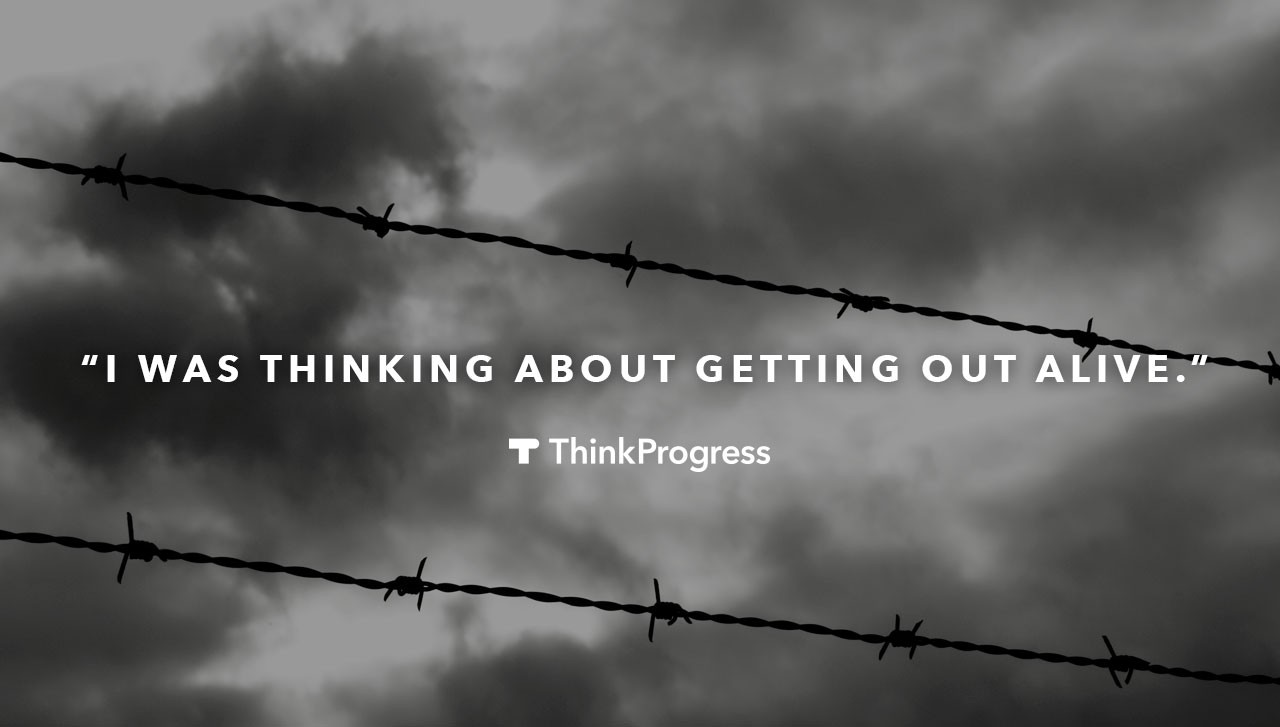As soon as Stewart Anderson stepped foot inside the Lorton Reformatory, a Virginia prison, he knew he’d have to work for negligible pay in order to endure his 20-year sentence. At Lorton, prison labor was voluntary. But prison food was difficult to swallow, and Anderson wanted to supplement his diet with commissary items: peanut butter, noodles, dried fruit, and Kipper Snapper, a brand of fish in a can.
“It was more of a volunteer thing than it was forced labor, but it was tantamount to the same thing,” the D.C. native, who was convicted for assaulting a police officer, told ThinkProgress. “The system systematically forces you to work without ‘forcing you to work.’ Poor quality of food drives you to take on a prison job that pays you an average of 32 cents an hour, and you worked an average of five, six hours a day.”
Because he was able to read and write well, Anderson was always assigned to clerical work — answering phones and keeping inventory of products made by fellow prisoners. He was hellbent on avoiding the grunt work that most people have to do behind bars: scrubbing floors, cooking, sewing clothes, manufacturing license plates for the general public. He was equally determined to develop and hone skills he could use to employ himself when he got out. All the while, he was under no illusion that the purpose of the work was to train people like himself for the day they re-entered society.
He knew that the bottom line of correctional labor is to make the people who run prisons wealthier.
Anderson, now 56 years old, has been out of prison for nine years, but prison labor is more lucrative than ever. People behind bars are forced to do grueling, back-breaking, and dangerous work for nickles and dimes, while corporations rack up billions of dollars in profit off the cheap labor. They are put to work under the guise of rehabilitation, but the reality is that few people leave prison with the skills, knowledge, or resources to succeed professionally. They are an enticing alternative for large companies that don’t want to pay minimum wage to workers on the outside. And they have had enough.
On Friday, prisoners all over the country launched a national labor strike that’s been months in the making. Their demand is difficult but straightforward: ending prison slavery for good.

In state and federal facilities nationwide, prisoners like Anderson are used as cheap labor to work in call centers, clean, toil in fields, shovel snow, fight fires, and mass produce clothes, technology, and machinery. Corrections officials allow some of the biggest corporations in the world, such as Target, Walmart, and AT&T to operate inside their walls, in exchange for big kickbacks. Prisons that participate get a share of the profits, while the prisoners are paid far below the minimum wage of any state — mere cents for full-time work.
For those people doing time in federal prisons, the work isn’t optional. The Crime Control Act of 1990 established that all federal prisoners who are physically capable of work must have a job while serving their sentences. People who choose not to work are locked away in solitary confinement — deprived of dignity and human contact, Anderson said.
Fed up with being used for cheap labor, prisoners in approximately 40 facilities have agreed to cease working altogether. The strike was organized by three prison reform organizations, Incarcerated Workers Organizing Committee (IWOC), Support Prisoner Resistance, and the Free Alabama Movement — all of which have created a network of prisoners and allies to stand with them. But prisoners’ communication with the outside world is heavily restricted, so it’s impossible to verify how many are participating.
“When we remove the economic motive and grease of our forced labor from the US prison system, the entire structure of courts and police, of control and slave-catching must shift to accommodate us as humans, rather than slaves,” reads a joint call to action issued in April.
Prison staff and the companies that use prison labor argue the work helps rehabilitate inmates and equip them with professional skills they can use to find jobs once they leave prison. But prisoners say labor does nothing to help them find work on the outside, calling it exploitative instead. Additionally, people don’t make enough money to save for when they leave prison, so the work they do is fruitless.
Despite slowly shifting attitudes about the criminal justice system, the workforce still harbors a strong bias against people who have spent time in prison. An estimated 60 percent of the people who leave prison remain unemployed during the first year of their release. And close to 90 percent of employers take criminal records into consideration before hiring.
Regardless of the hard work they do during their sentences, there’s no guarantee that work will translate to a job with livable wages upon their return to society. What is certain, though, is that the corrections system will make money off of them.
Juan Reid, a D.C. native who completed a 14-year sentence three years ago, knows all too well that prisons thrive off the backs of the incarcerated.
“[Correctional officers] don’t really do nothing. We basically do everything. We cook for everybody. We clean up. We do everything,” he explained to ThinkProgress.
Reid also started his sentence in Lorton, and was shuffled from prison to prison, doing time in North Carolina, Oklahoma, Florida, Pennsylvania, and Texas. For years, he woke up around 3:30 a.m. and worked for 7 to 10 hours, five days a week. He swept facility floors, tossed trash, buffed floors, cooked, and served food. Altogether, Reid said, he earned approximately $17 a month — not enough to purchase items from commissary, let alone save up for the day he got out.
The pay grade system also felt exploitative. According to Reid, there were four tiers, or grades, of pay, with prisoners making between $0.12 and $0.40. But people weren’t compensated based on the duties they performed. Pay depended on their willingness to kiss up to corrections officers and rat people out, he said.
Reid made $0.12 an hour. “Ain’t nobody saving up no money for no kids and future and all that. You can’t,” he said.
In addition to doing mundane, mindless work for what essentially amounted to nothing, Reid had no one to teach him useful skills for finding — and maintaining —employment when he finished his sentence. That objective was a total farce. “It’s just dressed-up slavery,” he said.
Anderson felt the same way.
Even though he had more of a “white collar” job while locked up, earning about $0.30 a day, he understood that nobody in the prison was looking out for his future prospects. After fielding phone calls and doing basic accounting on weekdays, he had to do landscaping work on the weekends. And job training from staff or corporations they contracted with remained a myth throughout the duration of his long sentence.
“I came in the door understanding that that just wasn’t going to happen,” he said. “Not a chance.”
In order to survive re-entry, Anderson and Reid ultimately realized they’d have to be creative and enterprising on their own. Simply put, they’d have to train and rehabilitate themselves.

For Anderson, sitting around and waiting for institutional support wasn’t an option, with two daughters and a third on the way.
“What I used to tell people is: figure out what kind of job you can do for yourself and plan to leave prison and employ yourself,” Anderson said. “If you don’t, life gonna be rough. And for many people it is, because people don’t care about [how] you’re trying to turn your life around.”
He decided early on that his ability to read and write would set him on a path toward prosperity — not forced prison labor. When he wasn’t doing his mandatory clerical tasks, he dedicated his time to self-education. Anderson went to the law library every day, and took classes sponsored by the University of the District of Columbia (UDC). He also studied city planning and management, completing a Bachelors of Science in urban studies and more than 20 certified classes through Georgetown University.
Networking with other prisoners became a third job. Anderson knew he’d need a support system when he got out, and prioritized getting to know the people around him. To that end, he started a program for fathers to converse about their struggles and used his knowledge to counsel and mentor others.
Altogether, Anderson’s ingenuity and legwork behind bars prepared him for the world of business. Prison work had nothing to do with it.
“I didn’t have money, but what I knew was how to set up a business,” he said. “I knew how to promote. I knew how to market.”
Those skills helped him start a home inspections and home improvement business, which he still runs today. He currently works in real estate and writes on the side. Most recently, he managed a political campaign for Trayon White, who beat incumbent LaRuby May for D.C. City Council in May.
Unlike Anderson, Reid wasn’t prepared for the professional world at all.
The lack of job training provided by the prisons set him up for failure. He’d also spent the last seven years of his sentence in solitary confinement, and that sensory deprivation made social interactions vexing once he got out. He was quick to anger and found taking orders to be an almost insurmountable challenge, so holding down jobs was extremely difficult.
While locked up, Reid was never focused on getting an education or developing skills for the day he got out of prison.
“That can’t cross your mind when you’re thinking about survival. I was thinking about getting out alive,” he said. And there was nobody to teach him job skills for the day he got out.
Reid tried, over and over again, to maintain employment. After a string of failures, the only jobs he could sustain were miscellaneous, handyman jobs he found on Craigslist that didn’t require much social interaction, such as painting and cutting grass. But those jobs ultimately helped him come up with a solution to his problems: self-employment. He wanted to work on his own terms, on his own time, using the skills he developed doing the jobs he found online.
“It got to the point where I got good, and people always praised my work,” he said.
When he finally started to thrive outside prison, Reid remained in survival mode but became more motivated to help other people. Ultimately, he formed Tight Shift Labor, a worker cooperative for former prisoners and D.C. residents who want to stay away from the correctional system and own their own maintenance business.
According to Reid, the cooperative’s primary objective is to create a body of workers who are also part-owners of the company and give them a fair shot at survival. The workers will democratically make decisions about operations and management. The plan is still in the development stage, but Reid received LLC credentials in August. He says he’s already found a business partner, and hopes to find eight more within the next year. It’s taken time, but Reid has finally hit his stride.
Reid and Anderson landed in very different places after prison. But they both agree that working in prison wasn’t the key to their success. Self-motivation, patience, and personal talents helped them find their footing in the outside world.


